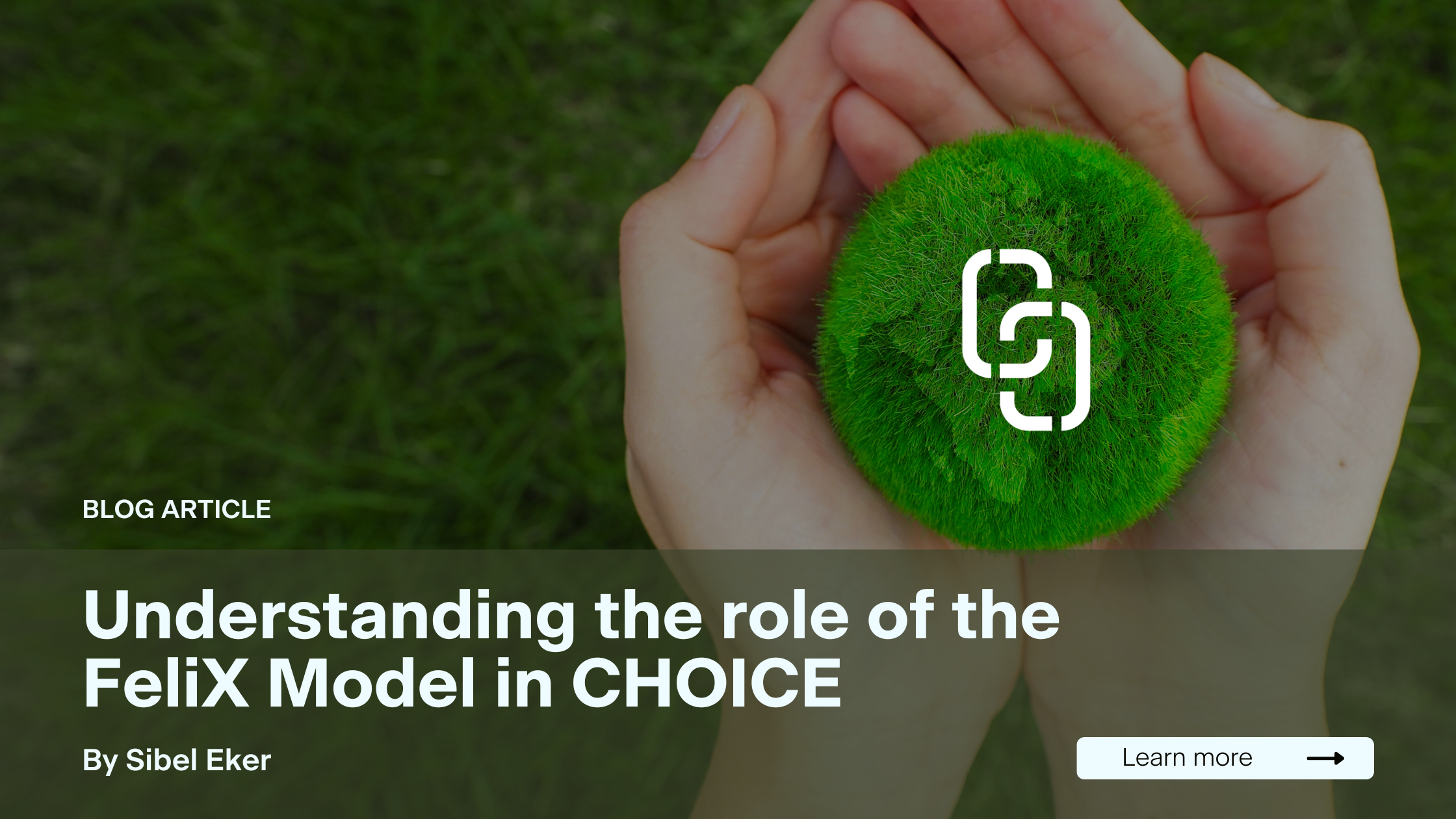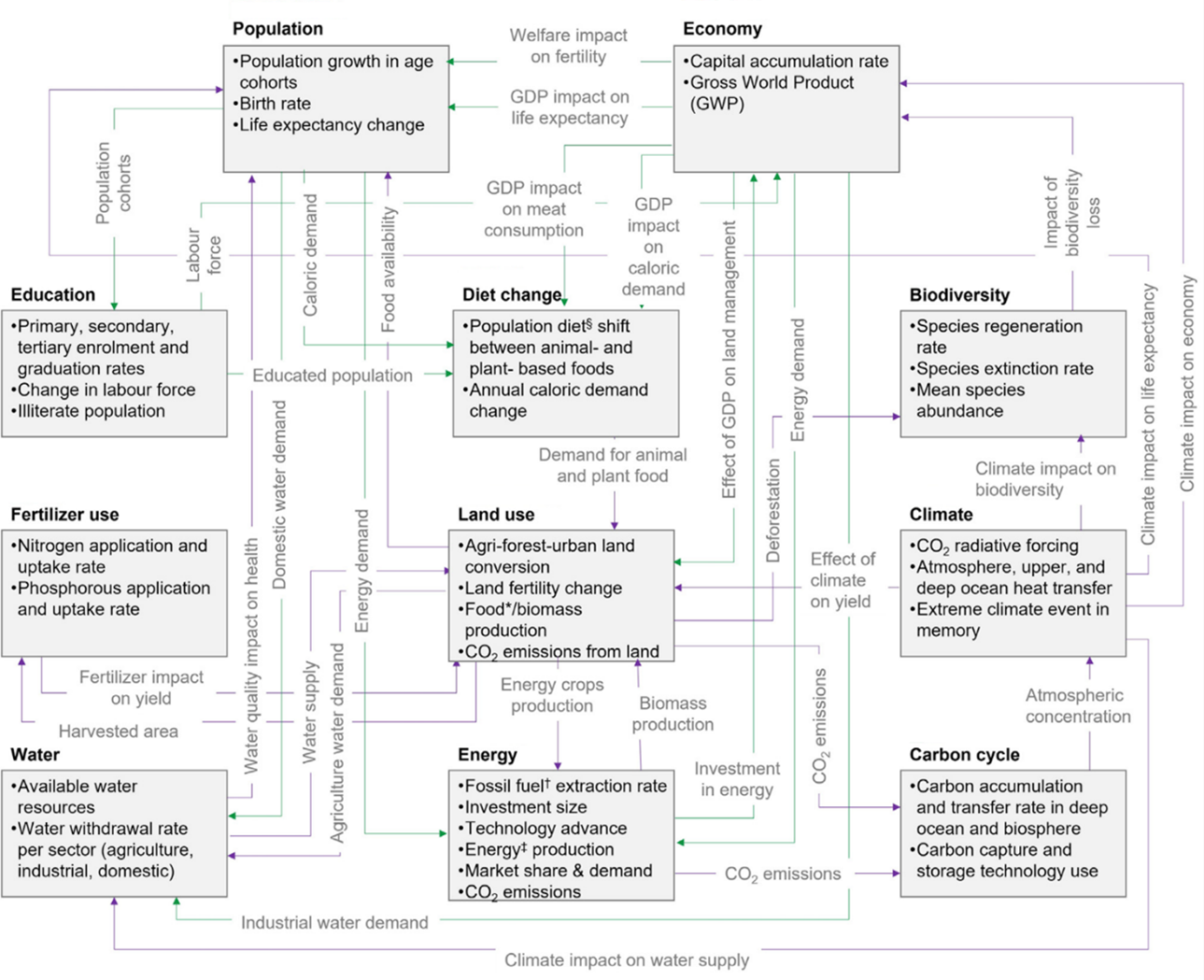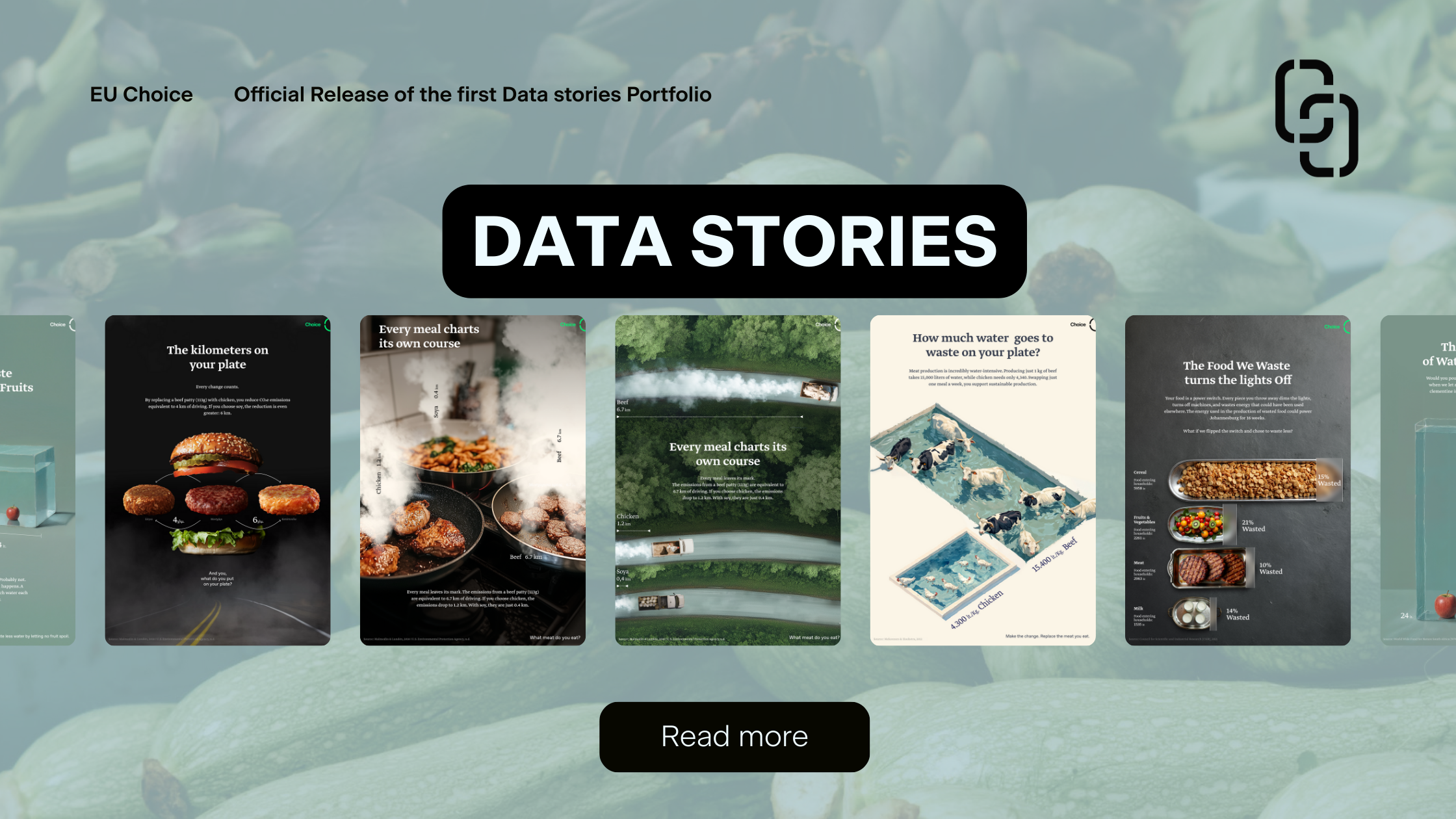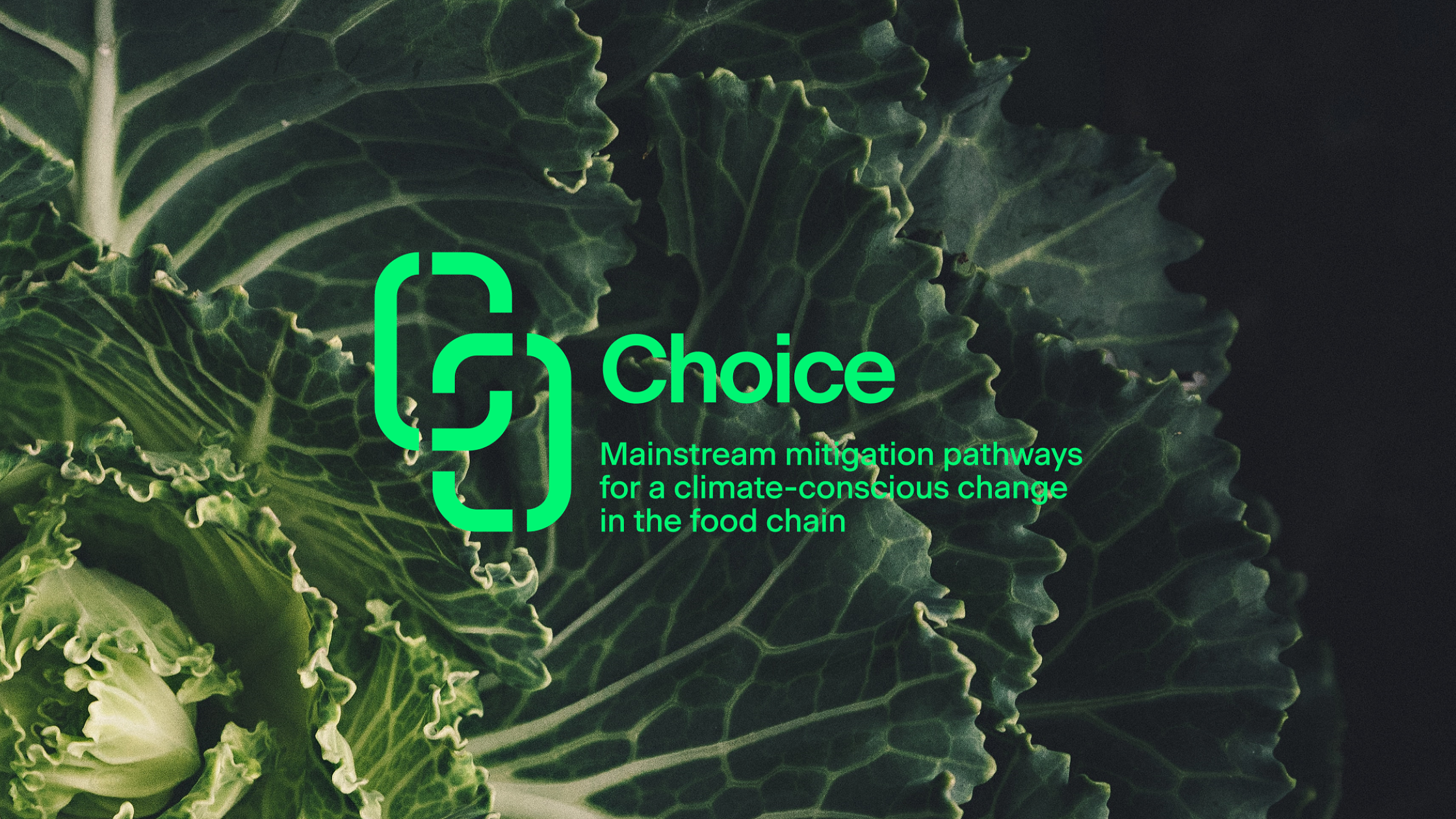
Understanding the role of the FeliX Model in CHOICE
Introduction to FeliX model

FeliX (Functional Enviro-economic Linkages Integrated neXus) is a globally aggregate, feedback-rich simulation model of climate, economy, environment and society interactions, developed at International Institute for Applied Systems Analysis (IIASA) originally for the purpose of supporting Earth observations. It represents the global population, education, economy, energy, water, land use, food, carbon cycle, climate, and biodiversity systems, as well as the feedback between them and provides future trajectories of these systems under different scenarios.
In the CHOICE project, FeliX will be used for two main purposes:
- Representing food-related lifestyle changes emerging from the interaction of cognitive, social, environmental and economic factors, hence exploring behavior–driven food demand scenarios;
- Developing an online interactive simulation environment where the users can explore various behavior change scenarios and their outcomes.
System Dynamics and Feedbacks in FeliX
FeliX is developed using the system dynamics modeling methodology to represent the main biophysical and anthropogenic mechanisms underlying global environmental and economic change. Figure 1 illustrates the main modules of FeliX and the feedbacks between them. The major human-earth system feedbacks modelled in FeliX include, for instance, the climate impacts of energy and land use, the environmental impacts of water and fertilizer use, and the feedback of climate damage and environmental degradation on economic growth, crop yields, and human mortality. Instead of the geographic, techno-economic and biophysical detail in those sectors, the model prioritizes the representation of feedbacks across different systems. FeliX operates on an annual timescale and projects future socioeconomic development and environmental conditions over the long term to 2100. Further information can be seen in the online model documentation and the accompanying scientific article, and the model itself is publicly available.
Figure 1: Overview of the FeliX model (Adapted from Moallemi et al. (2022))
Previous Applications of FeliX
In earlier studies, FeliX was used to assess the socioeconomic and environmental impacts of Earth observation improvement, to analyze the carbon cycle impacts of global emission pathways, to estimate the emission reduction potential of using algae as a livestock feed, and the population dynamics of shifts to sustainable diets. Thanks to the broad scope and feedback richness of the model, it was also possible to conduct an endogenous analysis of synergies and trade-offs between the Sustainable Development Goals (SDGs), where multiple SDGs could be projected simultaneously. In addition to this analysis SDG pathways beyond 2030, FeliX applications include a specific case of the trade-offs between mitigating environmental pressures and eradicating global poverty. Most recently, FeliX was used to explore the future dynamics of human wellbeing under different climate scenarios, where wellbeing is dependent on interactions between human health mortality, economic development, poverty, educational attainment and climate impacts, and the impacts of female empowerment policies on wellbeing. Moreover, the ongoing work using the FeliX model includes an analysis of the land use and emission impacts of alternative proteins (plant-based replacements, microbial protein produced with precision fermentation or cultivated meat) replacing conventional animal-sourced foods; and how the spared land can be used to stimulate other bioeconomy technologies such as bioplastics and cross-laminated timber.


Addressing Knowledge Gaps
One of the key knowledge gaps about the potential of demand-side mitigation, as identified in the most recent IPCC report, is how widespread behavior and lifestyle changes occur as a result of the dynamic interaction of individual, social, economic and environmental factors. One of the unique features of the FeliX model is representing dietary shifts and the resulting food demand based on endogenous population dynamics of dietary choices. This feature is based on the key theories of behavior change from environmental psychology, and captures the role of psychological and social factors such as climate risk perception and social norms, in addition to the socioeconomic drivers such as income and education level, as described in detail by Eker et al. (2019).
Expansion with CHOICE
CHOICE will expand this endogenous modeling of behavior changes in the FeliX model to incorporate multiple food-related behaviors such as waste reduction or adoption of alternative proteins, beyond shifts to low-carbon diets. For this purpose, we will adopt a lifestyle modeling framework, which divides the population into four lifestyle categories based on empirical data. We will then project the population fraction following each lifestyle category, their propensities to follow food-related low-carbon behaviors, the resulting food demand scenarios and their outcomes in terms of climate change and environmental impacts. In this way, we will be able to represent different consumer choices, and develop feasible behavior change scenarios.
The FeliX model plays a crucial role in the CHOICE project by simulating behavior-driven food demand scenarios and their environmental impacts.
It helps explore how cognitive, social, economic, and environmental factors influence lifestyle changes. By creating an interactive simulation environment, FeliX helps to engage IAM users in understanding the potential outcomes of various behavioral shifts.
Give it a try!
To stay updated and dive deeper into this innovative project, you can check out the FeliX model yourself, and stay tuned for more insights from our work!
References
- Ye, Q., Eker, S., 2024. The FeliX 2.0 webpage: overview of the underlying modeling methodology and links to the FeliX 2.0 resources and publications. https://iiasa.github.io/felix_docs/.
- Ye, Q., Liu, Q., Swamy, D., Gao, L., Moallemi, E. A., Rydzak, F., Eker, S., 2024. FeliX 2.0: An integrated model of climate, economy, environment, and society interactions. Environmental Modelling & Software, 179, 106121. DOI: https://doi.org/10.1016/j.envsoft.2024.106121.
- Moallemi, E.A., Eker, S., Gao, L., Hadjikakou, M., Liu, Q., Kwakkel, J., Reed, P.M., Obersteiner, M., Guo, Z., Bryan, B.A., 2022. Early systems change necessary for catalyzing long-term sustainability in a post-2030 agenda. One Earth, 5, 792–811. DOI: https://doi.org/10.1016/j.oneear.2022.06.003.
- Obersteiner, M., Rydzak, F., Fritz, S., McCallum, I., 2012. Valuing the Potential Impacts of GEOSS: A Systems Dynamics Approach. In: Laxminarayan, R., Macauley, M. (Eds.), The Value of Information. Springer, Dordrecht. DOI: https://doi.org/10.1007/978-94-007-4839-2_4.
- Walsh, B., Ciais, P., Janssens, I., et al., 2017. Pathways for balancing CO2 emissions and sinks. Nature Communications, 8, 14856. DOI: https://doi.org/10.1038/ncomms14856.
- Walsh, B.J., Rydzak, F., Palazzo, A., et al., 2015. New feed sources key to ambitious climate targets. Carbon Balance and Management, 10, 26. DOI: https://doi.org/10.1186/s13021-015-0040-7.
- Eker, S., Reese, G., Obersteiner, M., 2019. Modelling the drivers of a widespread shift to sustainable diets. Nature Sustainability, 2, 725–735. DOI: https://doi.org/10.1038/s41893-019-0331-1.
- Liu, Q., Gao, L., Guo, Z., Dong, Y., Moallemi, E.A., Eker, S., Yang, J., Obersteiner, M., Bryan, B.A., 2023. Robust strategies to end global poverty and reduce environmental pressures. One Earth, 6(4), 392-408. DOI: https://doi.org/10.1016/j.oneear.2023.03.007.
- IIASA flagship report, System Analysis for Sustainable Wellbeing. https://iiasa.ac.at/sites/default/files/2023-09/IIASA%20Flagship%20Report.pdf.
- Creutzig, F., Roy, J., Devine-Wright, P., Díaz-José, J., Geels, F.W., Grubler, A., Maïzi, N., Masanet, E., Mulugetta, Y., Onyige, C.D., Perkins, P.E., Sanches-Pereira, A., Weber, E.U., 2022. Demand, services and social aspects of mitigation. In: IPCC, 2022. Climate Change 2022: Mitigation of Climate Change. Contribution of Working Group III to the Sixth Assessment Report of the Intergovernmental Panel on Climate Change [Shukla, P.R., Skea, J., Slade, R., Al Khourdajie, A., van Diemen, R., McCollum, D., Pathak, M., Some, S., Vyas, P., Fradera, R., Belkacemi, M., Hasija, A., Lisboa, G., Luz, S., Malley, J. (Eds.)]. Cambridge University Press, Cambridge, UK and New York, NY, USA. DOI: https://doi.org/10.1017/9781009157926.007.
- Pettifor, H., Agnew, M., Wilson, C., 2023. A framework for measuring and modelling low-carbon lifestyles. Global Environmental Change, 82, 102739. DOI: https://doi.org/10.1016/j.gloenvcha.2023.102739.





